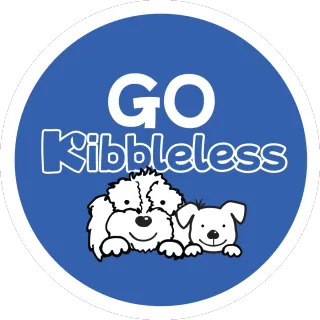F.A.Q.
We know you might have questions about Kibbleless, our services, and the Go Kibbleless movement.
Below, you’ll find answers to some of the most common questions we receive. If you have a question that’s not covered here, feel free to contact us directly.
1. What is the Go Kibbleless Movement?
The Go Kibbleless Movement is a mission-driven initiative founded by Nikki Kendal to help Paw Parents break free from the harmful effects of processed kibble and embrace the benefits of a canine-specific, whole food natural diet. It’s about raising awareness, educating Paw Parents, and making healthier choices for our furry family members—one healthy bowl at a time.

2. What services do you offer?
We offer a variety of ways to support Paw Parents and their furry family. Our courses include Before the Bowl™ and The Kibbleless Challenge™, with advanced programs like The Kibbleless Life™ and Beyond the Bowl™ coming soon. We also provide private coaching for Paw Parents who prefer extra guidance. Beyond education, we have a growing store with KIBBLELESS merchandise, a children’s book series with companion coloring books, and resources like our blog and petition to support the movement.
3. Why should I choose a nutritional canine coach?
Navigating the world of dog food can be confusing and overwhelming. A nutritional canine coach like Nikki helps you cut through the noise, providing personalized guidance to ensure your dog’s diet supports their overall health and well-being. Whether you’re new to natural feeding or looking to enhance your dog’s current diet, Nikki’s expertise will give you the confidence to make the best choices for your dog.

4. What’s wrong with feeding my dog kibble?
While kibble is convenient, it comes with significant risks that many Paw Parents may not be aware of. Commercial dog "food" contain additives, fillers, synthetics, and toxins that can lead to serious health problems over time. These highly processed "foods" are not biologically appropriate for dogs, leading to nutritional deficiencies that can cause the early onset of diseases such as obesity, heart disease, and even certain types of cancer.
But the risks don’t stop there. Feeding your dog kibble can also lead to a range of other health issues, including:
Skin Problems: Kibble can contribute to yeast overgrowth, leading to chronic skin issues like itching, redness, and ear infections.
Digestive Issues: Dogs fed on kibble often suffer from vomiting, diarrhea, acid reflux, and even more severe digestive conditions like pancreatitis.
Weakened Immune System: The lack of essential nutrients in kibble can weaken your dog’s immune system, making them more susceptible to infections and other illnesses.
In fact, American dogs are living shorter lifespans today, and the widespread use of kibble is a major contributor to this decline. The reality is, we often have no idea what actually goes into kibble. Ingredients that would never be considered safe for human consumption often end up in dog food, and there’s little to no transparency or accountability in the industry. This is one reason why multiple countries outside the US have banned the sale or distribution of American-made kibble.
Unfortunately, many of us in America remain unaware of these dangers. By switching to a whole food, natural diet -- what our carnivore companions should actually eat -- we can greatly improve our dogs’ health, energy levels, and overall well-being, giving them the longer, healthier lives they deserve.
5. How do I transition my dog from kibble to a whole food diet?
Transitioning isn’t just about swapping food—it’s about preparing your dog’s body for the change. That’s why my focus is all things transition.
Before the Bowl™ prepares YOU for the transition.
The Kibbleless Challenge™ walks you step by step through the full transition as you prepare YOUR DOG for the diet.
The Kibbleless Life™ walks you step by step in creating meal rotations for your dog for life.
For Paw Parents who want extra support, I also offer private coaching after the courses.
6. Is a whole food diet more expensive than kibble?
While the upfront cost of whole foods can be higher than kibble, investing in your dog’s health now can save you from costly vet bills down the road. Many Paw Parents find that the health benefits—such as improved energy, fewer allergies, and a longer lifespan—far outweigh the cost difference. Additionally, Nikki can help you find budget- friendly options for feeding your dog a whole food diet without sacrificing quality.
7. My vet says kibble is best, why should I go Kibbleless?
Many veterinarians recommend kibble because it’s convenient and often promoted by large pet food companies. However, it’s important to remember that kibble is a highly processed food that is not biologically appropriate for dogs. The Go Kibbleless movement is about returning to a more natural, whole food diet that aligns with what dogs are meant to eat. While vets are essential partners in your dog’s health, it’s important to do your own research and consider what’s truly best for your dog’s long- term well-being.
8. Is there a one-size-fits-all meal plan for dogs?
No, there isn’t a one-size-fits-all meal plan for dogs. Each dog is unique, with different needs based on factors like age, breed, size, activity level, and health conditions. That’s why we offer custom meal plans tailored specifically to your dog’s needs. By working with Nikki, you’ll receive a plan that’s designed to support your dog’s individual health and well-being.
9. What if my dog has allergies?
If your dog has allergies, a custom meal plan is even more important. Many commercial dog foods contain common allergens like corn, wheat, soy, and artificial additives. By feeding a whole food diet tailored to your dog’s specific needs, you can often identify and eliminate the ingredients causing the allergic reactions. Nikki can help you create a plan that avoids known allergens and supports your dog’s overall health.
10. Aren’t bones dangerous?
Raw bones can be an excellent source of nutrients for dogs and are part of a species- appropriate diet. However, it’s important to choose the right type of bones. Cooked bones can splinter and cause serious health issues, so always feed raw, meaty bones that are appropriately sized for your dog. Nikki can guide you on which bones are safe and how to feed them properly.
11. Raw food has bacteria in it, will my dog or my family get sick?
Dogs have a highly acidic digestive system that is naturally equipped to handle bacteria found in raw meat. However, safe handling practices are essential to prevent contamination for humans. Always use clean utensils, bowls, and surfaces when preparing raw food, and wash your hands thoroughly after handling. Properly sourced raw food that is fresh and stored correctly minimizes any risk of bacterial infection for both your dog and your family.
12. I don’t feel comfortable feeding raw, is there another option?
Yes, if you’re not comfortable feeding raw, there are other options for providing a whole food diet. Gently cooked meals using fresh, high-quality ingredients can also be species-appropriate and nutritionally complete. Nikki can help you design a gently cooked meal plan that meets your dog’s needs while ensuring they receive all the necessary nutrients.
13. What is a species-appropriate diet?
A species-appropriate diet is one that aligns with the natural dietary needs of a specific species—in this case, dogs. Dogs are carnivores by nature, and their bodies are designed to thrive on a diet rich in animal proteins, fats, and minimal carbohydrates. A species-appropriate diet for dogs mimics what they would naturally eat in the wild, focusing on fresh, whole foods like meats, organs, and bones, with the appropriate balance of nutrients to support their overall health. This also includes adding in a variety of fruits and vegetables, which provide essential vitamins, minerals, and fiber to complement the meat-based diet.
14. Why shouldn’t dogs eat carbs?
Dogs do not have a biological need for carbohydrates. While some carbs can be digested, they often contribute to health issues like obesity, heart disease, and digestive problems. Carbohydrates, especially in the processed form found in kibble, can cause spikes in blood sugar and contribute to chronic inflammation. Dogs thrive on a diet that is high in protein and fat, with minimal to no carbs, as this is what their bodies are naturally adapted to process.
15. I’ve been told a grain-free diet can cause cardiomyopathy in dogs, is this true?
The concern about grain-free diets and Dilated Cardiomyopathy (DCM) stems from a taurine deficiency, which is often caused by a lack of adequate meat in the diet. Taurine is an essential amino acid for heart health, and it is found in high-quality animal proteins. Unfortunately, many grain-free kibbles use legumes and potatoes as fillers, which can interfere with taurine absorption and lead to DCM. Even though kibble may claim to be high in protein, much of that protein can come from plant sources rather than meat, leading to a deficiency in essential nutrients like taurine. A diet rich in real, high-quality meat, as part of a species-appropriate diet, ensures your dog gets the taurine they need for a healthy heart.
16. What certifications do you have?
Nikki holds certifications in canine nutrition and has extensive experience working with dogs and their dietary needs. With a background in elementary education and psychology, Nikki is also skilled in teaching and breaking down complex topics into simple, actionable steps. Her dedication to learning and her personal experience with the kibble crisis drive her passion for helping other Paw Parents make informed choices about their dog’s nutrition.

